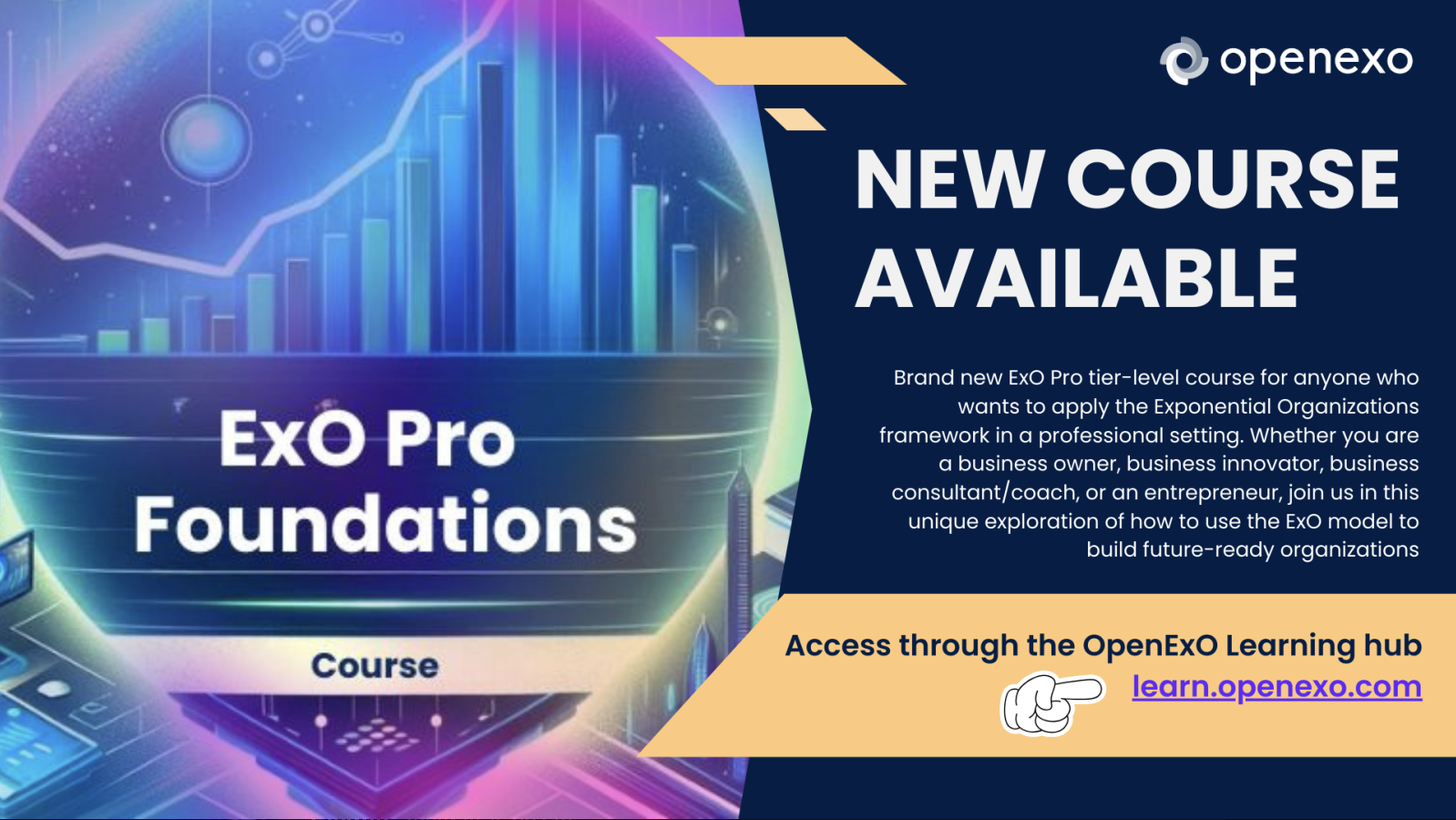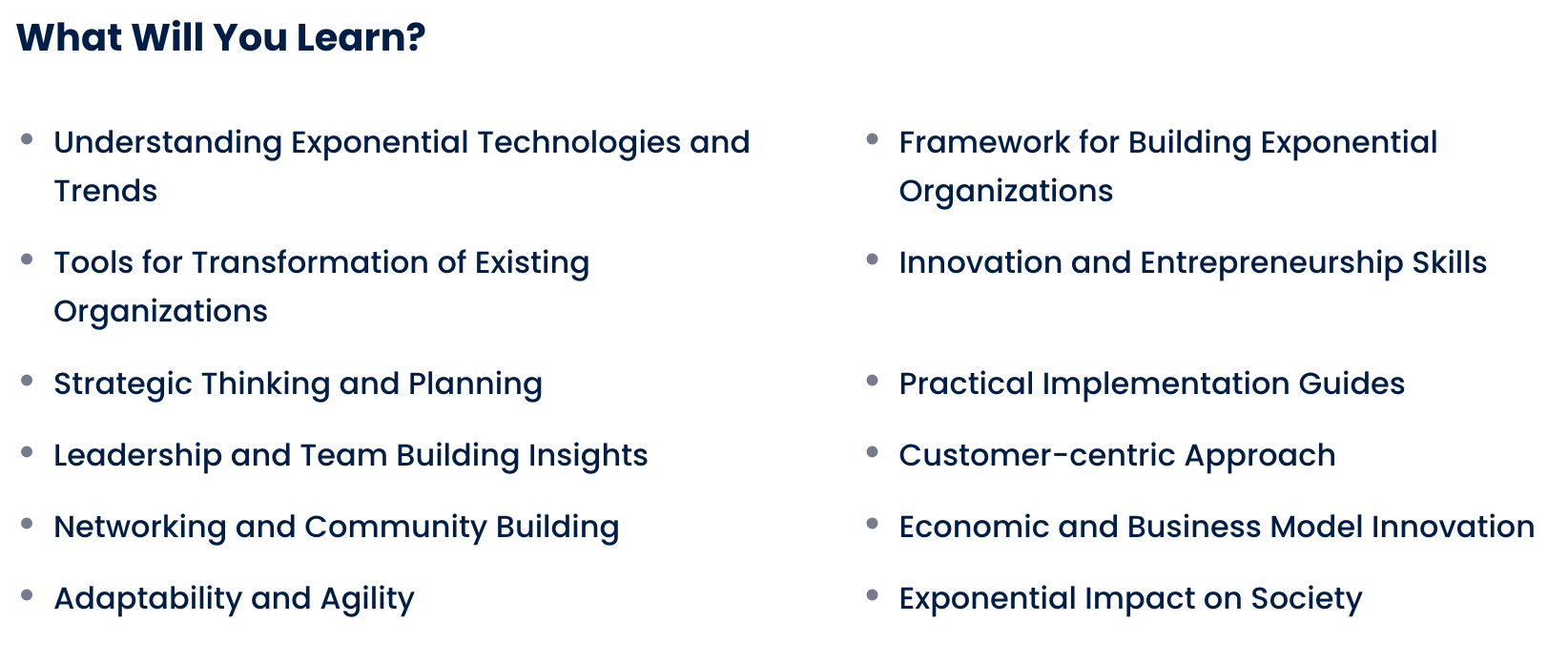
Transforming Organizations: Unlocking the Four Principles of System Change
Transforming organizations and systems is a complex and ongoing endeavor that requires a fundamental shift in mindsets, behaviors, and approaches.
Exponential Organizations (ExOs) must continuously adapt and evolve to remain competitive and relevant. However, true organizational transformation goes beyond surface-level changes or incremental improvements.
It requires a fundamental shift in the way systems operate and people think and interact within those systems to design the organization in sync with their MTP - Massive Transformative Purpose.
This is where Otto Scharmer's Theory U and its four principles of system change come into play.
Developed by Otto Scharmer, a senior lecturer at MIT and co-founder of the Presencing Institute, Theory U offers a comprehensive framework for leading profound change in organizations and societal systems.
At its core are four interrelated principles that challenge conventional wisdom and provide a roadmap for catalyzing systemic transformation.
Let's explore each of these principles and their implications for organizational change.
Principle 1: You cannot understand a system until you change it (K. Lewin)
This principle, attributed to psychologist Kurt Lewin, suggests that our perspective and mental models inherently limit our understanding of a system. To truly comprehend the dynamics and interdependencies within a system, we must actively intervene and observe how it responds and adapts to change.
This principle encourages leaders and change agents to challenge assumptions, experiment with new approaches, and actively disrupt the status quo.
Organizations must embrace a mindset of prototyping, piloting, and iterative learning rather than solely relying on analysis and planning.
For example, instead of spending months developing a detailed strategic plan based on current market conditions, an organization could rapidly test and refine various business models or product concepts through small-scale experiments.
By observing how the system reacts to these interventions, the organization gains invaluable insights into its true nature and can adapt its strategy accordingly.
Principle 2: You cannot change a system until you transform consciousness
This principle highlights the critical role of individual and collective consciousness in driving systemic change. Organizations are not merely structures and processes; they are living systems shaped by the mindsets, beliefs, and behaviors of the people within them.
Transforming an organization requires a fundamental shift in consciousness – a willingness to question deeply held assumptions, embrace new perspectives, and cultivate a sense of shared purpose and responsibility.
This principle calls for organizations to invest in personal and professional development programs that expand mindsets, foster self-awareness, and cultivate emotional intelligence.
It also involves creating spaces for open dialogue, where diverse viewpoints can be shared and explored without judgment.
For instance, an organization seeking to become more customer-centric could engage employees in immersive empathy-building exercises, such as shadowing customers or role-playing their experiences.
Deepening their understanding of customer needs and challenges can help employees shift their consciousness and align their actions with the organization's customer-focused mission.
Principle 3: You can't transform consciousness until you make a system see + sense + invert itself
Building upon the second principle, this principle emphasizes the need for systems to develop self-awareness and the ability to perceive themselves from multiple perspectives. Only then can they truly transform their consciousness and embrace new ways of operating.
This principle translates into creating mechanisms for continuous feedback, reflection, and adaptation. Organizations must cultivate a culture of transparency, where information flows freely and challenges are openly discussed. They must also encourage critical thinking and challenge established practices and norms.
One way to achieve this is through regular "sensing journeys," where cross-functional teams immerse themselves in different parts of the organization or external environments to gain fresh insights and perspectives. By actively seeking out diverse viewpoints and challenging assumptions, organizations can develop a deeper understanding of their own blind spots and opportunities for transformation.
Principle 4: You can't lead systems transformation unless you sense and presence the future as it emerges
The final principle underscores the importance of anticipating and embracing emerging future possibilities. Successful system transformation requires leaders who can perceive and embody the future they wish to create (MTP) rather than being constrained by past experiences or current realities.
This principle encourages leaders to cultivate a vision for the future that transcends short-term goals or incremental improvements.
It involves developing the capacity to sense and tap into emerging trends, technologies, and societal shifts that could disrupt or catalyze the organization's evolution.
Organizations can foster this capacity by establishing dedicated teams or roles focused on future scanning and scenario planning. These teams would continuously explore potential future scenarios, identify early signals of change, and experiment with prototypes or pilot projects that could shape the organization's future direction.
Additionally, leaders must embrace a mindset of continuous learning and growth, actively seeking diverse perspectives and experiences that challenge their assumptions and expand their understanding of what is possible.
Putting the Principles into Practice
While these four principles may seem abstract or philosophical, their practical application is essential for driving meaningful organizational transformation.
Here are some practical steps organizations can take to embody these principles:
1. Cultivate a culture of experimentation and learning: Encourage employees at all levels to challenge assumptions, test new ideas, and embrace failure as a learning opportunity. Celebrate small wins and reward those who take calculated risks.
2. Invest in personal and professional development: Offer programs and experiences that foster self-awareness, emotional intelligence, and the ability to embrace diverse perspectives. Encourage open dialogue and create safe spaces for challenging conversations.
3. Establish feedback loops and reflection mechanisms: Implement regular check-ins, retrospectives, and sensing journeys to gather insights from various stakeholders and environments. Use this feedback to adapt and evolve continuously.
4. Embrace scenario planning and future sensing: Dedicate resources to exploring potential future scenarios, identifying emerging trends, and prototyping innovative solutions that could shape the organization's future direction.
5. Lead by example: As leaders, embody the principles of continuous learning, openness to change, and the ability to sense the future. Encourage others to follow your example and support their growth and development.
Summary :
Transforming organizations and systems is a complex and ongoing endeavor that requires a fundamental shift in mindsets, behaviors, and approaches.
By embracing these principles and embedding them into the fabric of their organizations, leaders can unlock the potential for profound and lasting transformation.
It is a journey that requires courage, humility, and a willingness to challenge conventional wisdom.
But for those who embark on this path, the rewards are immense – organizations that are agile, resilient, and capable of thriving in an ever-changing world.


ExO Insight Newsletter
Join the newsletter to receive the latest updates in your inbox.









